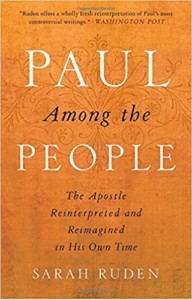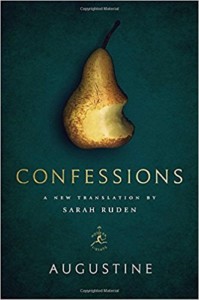Fresh takes on towering historical icons like Saint Paul and Saint Augustine are rarer than book publishers would like to claim. This is in part because of the stubborn presence of actual words that any interpreter must confront. Many moons ago, I discovered all of this to my dismay as I labored over a thesis on the Letter to the Romans. I felt decidedly less clever at the end of it all than at the outset. The text of Paul’s epistle had this funny way of funneling my fresh insights back into the common stew of Pauline studies. In other writers, I have sometimes discovered apparently novel interpretations, only to find later on the very same interpretation lodged in a patristic tome of old.
Eventually, one finds this general sense of agreement a comfort, at least if one believes in and is searching for Truth. It would disconcerting, to say the least, to find that the Church has been misreading Saint Paul for nearly twenty centuries, even if one were himself or herself the Vessel of Correction. Most new ideas about the Bible or the Church Fathers have in common a willingness to ignore counter-evidence from those same stubborn texts that rerouted my barque back into harbor.
So it was with no small delight that I read Sarah Ruden’s Paul Among the People some years ago. Amidst teaching assignments at Harvard, Yale, and the University of Cape Town, Ruden has been a prolific author and translator for nearly a decade. What makes her work on Saint Paul so compelling is her awareness of classical culture and her sympathy for the earthy realities of life in antiquity. She is able to depict Paul as a great champion of love and freedom by stripping away the anachronisms accumulated over five centuries of interdenominational debate. She writes with a light touch, an assurance that avoids the preachy or polemic tone.
The reader can imagine how excited I was to see that, after tackling Virgil’s Aeneid and Apuleius’s The Golden Ass, she turned her Latin skills to a Christian classic, Saint Augustine’s Confessions. I’ve begun making my way through it, and so far Ruden’s quirky but compelling take has won me over. I’ve read chunks of Confessions in the original Latin, and I’ve read four or five different translations. Most translations tend to err in the direction of pious seriousness. In my opinion, this is a disservice to Augustine, whose poignant observations on boyhood games and love of puns have slowly charmed me away from the early impression I had of him as a dour, mitered scold. Being not much more of a Latinist than I am an expert in Saint Paul’s Greek, I had been keeping my arriviste opinion to myself. Then I was emboldened by the endorsement of the “unsurpassed biographer of Augustine,” Peter Brown.
 Brown’s NYRB review of Ruden’s translation focuses not so much on the changed tone of Augustine himself, but on the effect that this change of tone has on the depiction of God. Since the 1981 publication of previously unknown letters of Augustine by Austrian scholar Johannes Divjak, Brown has made a point of softening the adamantine image of the bishop of Hippo. If you read Brown’s biography (you should!), be sure to read the revised edition that contains Brown’s reappraisal. Browns’ influence is such that scholarly opinion has been following his lead. I want to emphasize here that the interpretation of Augustine as a proto-Puritan with Jansenist scruples is, like the Saint Paul of Luther’s imagination, a modern production. Anyone familiar with Saint Augustine’s “afterlife” in the Western Middle Ages will quickly become aware of the love that both monks and schoolmen shared for Augustine’s prodigious output, and for the man himself. As was the case with Saint Paul, Ruden’s new translation of Confessions is a vindication of the bulk of Catholic testimony regarding Saint Augustine, a genuinely fresh take that succeeds in restoring, in a modern idiom, an older appreciation for his humanity as well as his genius.
Brown’s NYRB review of Ruden’s translation focuses not so much on the changed tone of Augustine himself, but on the effect that this change of tone has on the depiction of God. Since the 1981 publication of previously unknown letters of Augustine by Austrian scholar Johannes Divjak, Brown has made a point of softening the adamantine image of the bishop of Hippo. If you read Brown’s biography (you should!), be sure to read the revised edition that contains Brown’s reappraisal. Browns’ influence is such that scholarly opinion has been following his lead. I want to emphasize here that the interpretation of Augustine as a proto-Puritan with Jansenist scruples is, like the Saint Paul of Luther’s imagination, a modern production. Anyone familiar with Saint Augustine’s “afterlife” in the Western Middle Ages will quickly become aware of the love that both monks and schoolmen shared for Augustine’s prodigious output, and for the man himself. As was the case with Saint Paul, Ruden’s new translation of Confessions is a vindication of the bulk of Catholic testimony regarding Saint Augustine, a genuinely fresh take that succeeds in restoring, in a modern idiom, an older appreciation for his humanity as well as his genius.
Calvin College’s James K. A. Smith will have none of it. I found it a bit disheartening when an intellectual of his status and caliber gave up on Ruden literally after one line. He claims to have been chastised by Brown’s review into questioning himself. This probing self-doubt seems to have lasted about two minutes before he’s back trying to burnish the statuesque, seriously pious Augustine. His big beef? Ruden’s decision to translate dominus as “Master” rather than as the (supposedly) traditional “Lord.” Smith seems to concede that “master” is a legitimate option–for a classicist. But the rest of us, he believes, want not accuracy but a “devotional classic.” It is telling that Smith begins his review openly admitting that when it comes to translations his preferences are nostalgiac and emotional and not rational. And, frankly, it is irrational to insist that Augustine say what Smith thinks he ought to say, based on his queasiness with the (modern, American, contextual) connotations of the word “master.”
Smith does ask two important questions: “which afterlife of words is most germane to the project that Augustine himself is engaged in? Which history of connotation overlaps with Augustine’s endeavor?” This gets at the heart of my difference from Smith on a number of related issues. Different confessional traditions will answer these questions differently. I would like to think that Benedictines, whose Rule of Life is deeply influenced by Saint Augustine’s own experience as a monk, who read large portions of Augustine’s work–ranging across the different genres of treatise, Biblical commentary, homiletic, and personal letters–at the daily liturgy, and whose institutional history includes at least two centuries of direct engagement with international politics, have as good a claim as anyone to bearing the standard of Augustine’s project/endeavor. From my (Catholic, monastic) perspective, Jean Calvin’s interpretations of Saint Augustine are just those sorts of “new” interpretations that can only exist by suppressing counter-evidence and dissenting voices.
And, in fact, English-speaking Catholics readily use the word “Master” to address God, for example, in the misattributed “Prayer of Saint Francis.” “O Divine Master, grant that I may not so much seek to be consoled as to console…” English-speaking Orthodox will be familiar with this translation of the prayer of Saint Ephraim, “O Lord and Master of my life, take from me the spirit of sloth…”
But more to the point, we are arguing about a word choice in a modern language. Before the Reformation, and for plenty of Catholics since, God is Dominus. It is understood, at some level, that whether we use Lord or Master, what we mean is Dominus or Kyrios (perhaps even Adonai). Whatever connotations have attached themselves to Lord or Master in the past five hundred years, a span in which the English language has largely developed apart from direct influence by Rome or Constantinople, they may well be part of the shared distortion that has afflicted the memories of Saint Paul and Saint Augustine. More power to Sarah Ruden for inviting us to step back from our allegiances and question ourselves.